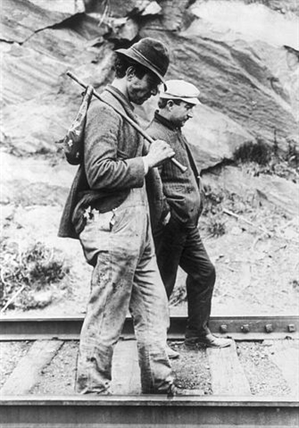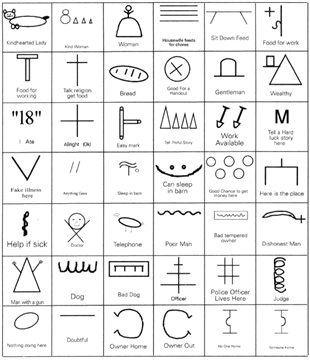
(DON THOMPSON / iNFOnews.ca)
February 12, 2018 - 12:00 PM
OPINION
Last week, during a cab ride from Louis Armstrong International Airport to the French Quarter in New Orleans, I noticed some faded glyphs on the side of a derelict building just off Ramparts Street. Largely unrecognizable and indecipherable, most people likely pass it every day without a second glance.
The roughly painted stick figures and slashing lines are decades old…remnants of a language few people speak today. But not so long ago these symbols spoke to more than two million Americans and Canadians. Such was the language of hoboes.
Most people today probably believe hoboes are a thing of the past…and they are for the most part. Hoboes started becoming a force in the mid-1800s…and those who considered themselves hoboes peaked during the Great Depression.
Language is organic…forever morphing to accommodate and reflect our cultures and times. Perhaps some people we refer to as “homeless” today would have been hoboes in a different era. But not all hoboes were homeless…they traveled North America looking for work…walking, hitchhiking and more dangerously…riding the rails. But the majority returned home to families when they could…even if absent a year or more.

Image Credit: Library of Congress
Online dictionaries often mischaracterize hoboes. They were neither “bums” nor “tramps”…the lexicon back in the day for people not looking for work…just a handout …spare change, food, drink and tobacco. Tramps tended to travel…riding the rails like hoboes…but not working. Bums tended to be older - often in poor health - and stayed in one place…more or less adopted and cared for by their communities.
The name hobo has a rather imprecise lineage. Scholars have variously put forth premises that hobo was a diminutive for “homeward bound” soldiers from the U.S. Civil War…or that migratory farm workers with their own tools or “hoe boys” was further shortened to hoboes…or the Latin words “homo bonus” for “good man” ultimately became hobo. The plural - by the way - can be spelled hoboes or hobos…though today you see the former rather than the latter most often.
Hoboes left an indelible mark on our culture…and our language. Phrases used by hoboes became more or less standard use with the greater population. Everyone knew the busiest road in a town as the “main drag.” A “moniker” was your nickname. Late-night workers toiled on the “graveyard shift.” Beggars and tramps were “moochers.” Stolen goods were “hot.” Coffee was a “cup of Joe,” and food was “chow.” If you were a drug addict…you were a “junkie.” If you’re a little long in the tooth like me and have been in a few old-fashioned diners, you’ve heard the hobo term for two fried eggs and toast called “Adam and Eve on a raft.”
There are dozens more phrases that worked there way into the vernacular…and many remain today. Who hasn’t heard someone dressed up in their best clothes call them their “glad rags,” or refer to something’s price as so many “clams” or “smackers?” Hoboes often called each other “stiffs”…and if things went well…you were a “working stiff.” Sound familiar?
Regardless, the hobo became a culture within a culture…a society within a society. It developed its own Code of Ethics…a fifteen-point list of how to live and work that was passed at the National Hobo Convention in St. Louis in 1889. That’s right…hoboes had national conventions…and unions. Dues were low to recruit and retain members…often a nickel a year.
The Hobo Code - quoted here from a U.S. Library of Congress document - seems like words to live by…even today.
YOU DO YOU. Decide your own life, don't let another person run or rule you.
SHOW SOME RESPECT. When in town, always respect the local law and officials, and try to be a gentleman at all times.
DON'T BE AN OPPORTUNIST. Don't take advantage of someone who is in a vulnerable situation, locals or other hobos.
GET A JOB. Always try to find work, even if temporary, and always seek out jobs nobody wants. By doing so you not only help a business along, but ensure employment should you return to that town again.
BE A SELF-STARTER. When no employment is available, make your own work by using your added talents at crafts.
SET A GOOD EXAMPLE. Do not allow yourself to become a stupid drunk and set a bad example for locals' treatment of other hobos.
BE MINDFUL OF OTHERS. When jungling in town, respect handouts, do not wear them out, another hobo will be coming along who will need them as badly, if not worse than you.
DON'T LITTER. Always respect nature, do not leave garbage where you are jungling.
LEND A HAND. If in a community jungle, always pitch in and help.
PRACTICE GOOD HYGIENE. Try to stay clean, and boil up wherever possible.
BE COURTEOUS WHEN YOU'RE RIDING THE RAILS. When traveling, ride your train respectfully, take no personal chances, cause no problems with the operating crew or host railroad, act like an extra crew member.
AND WHEN YOU'RE NOT. Do not cause problems in a train yard, another hobo will be coming along who will need passage through that yard.
HELP OUT THE KIDS. Help all runaway children, and try to induce them to return home.
SAME GOES FOR HOBOS. Help your fellow hobos whenever and wherever needed, you may need their help someday.
LEND YOUR VOICE. If present at a hobo court and you have testimony, give it. Whether for or against the accused, your voice counts!
Replace the word hobo and this Code resembles those of the most noble civic clubs and humanitarian groups in North America. You might be unaware, too, that hoboes - largely through their unions - ran boarding houses and shelters. Called a Hotel DeGink, they were found from New York to California by the 1930s.

Symbols used by hoboes to help each other travel safely.
Image Credit: WIKIMEDIA COMMONS
But the vast majority of hoboes slept and lived for days, weeks or months at a time in “jungles”…encampments usually just outside towns and often near railroad tracks. They usually set up their own governments…with a mayor…had courts where offending hoboes could be punished…banishment being the most severe decision.
Yes, hoboes were surprisingly organized by the turn of the 20th century. The International Brotherhood Welfare Association in Cincinnati, Ohio set up hobo colleges there, as well as in St. Louis, Chicago, Kansas City, Baltimore, Buffalo and San Francisco. Hoboes could sleep, wash up themselves and their clothes, and contribute to a mulligan stew…while taking actual free classes during the day on vagrancy laws, industrial law, job hunting and disease prevention.
By the early 1900s there were a few hobo newspapers…one - the Hobo News - had a paid circulation of more than 20,000 readers by 1915.
Hoboes were treated well in some places and terribly in others. Some towns and cities worked to accommodate them and make it work for all citizens, and some treated them as pariah. Just as today’s homeless are often painted broadly with the same brush - treated somehow less than human - hoboes often felt the sting of public persecution.
The railroads nationwide that tens of thousands of hoboes helped build in the late 1800s and early 1900s, would hire guards or “bulls” to keep hoboes and others from riding the rails. As unbelievable as it might seem, as many as 6,500 hoboes were killed in a single year trying to ride the rails - most often by paid “bulls” - during the Great Depression of the 1930’s.
Hoboes were an important part of America and Canada…and deserve a place in history commensurate with their contributions…like immigrants, and slaves. They were “working stiff” Americans and Canadians…and we should never forget that.
– Don Thompson, an American awaiting Canadian citizenship, lives in Vernon and in Florida. In a career that spans more than 40 years, Don has been a working journalist, a speechwriter and the CEO of an advertising and public relations firm. A passionate and compassionate man, he loves the written word as much as fine dinners with great wines. His essays are a blend of news reporting and opinion.
We welcome your comments and opinions on our stories but play nice. We won't censor or delete comments unless they contain off-topic statements or links, unnecessary vulgarity, false facts, spam or obviously fake profiles. If you have any concerns about what you see in comments, email the editor.
News from © iNFOnews, 2018